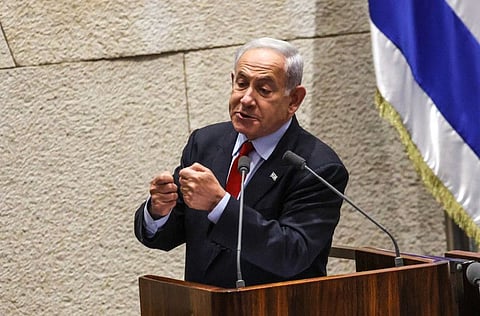Clearing Israel budget, Netanyahu hints at resumption of judicial overhaul
Introduction of reforms in January set off months of unprecedented demonstrations

Jerusalem: Prime Minister Benjamin Netanyahu secured a two-year Israeli national budget on Wednesday and suggested this could clear the way for a resumption of his religious-nationalist coalition’s contested judicial overhaul.
Opposition politicians, who have been in compromise talks with the government over the proposed reforms since they were suspended in late March, protested. One threatened to “shake up the country” if Netanyahu pursues the legislation unilaterally.
The introduction of the reforms in January set off months of unprecedented anti-government demonstrations, spooking some foreign investors as well as international credit agencies.
Netanyahu and his allies control 64 of parliament’s 120 seats, a comfortable majority that clinched him relatively swift ratification of the 484 billion shekel ($131 billion) and 514 billion shekel 2023-2024 spending packages.
“A new day dawns,” he told Channel 14 TV upon emerging from the all-night Knesset debate, pledging to next tackle inflation, which stands at 5%.
Asked if the judicial reforms were also now back on the agenda, Netanyahu said: “Certainly. But we are trying to reach understandings (in the compromise talks). I hope we will succeed in that.” Netanyahu says the overhaul, which would limit some Supreme Court powers and give the coalition greater control over appointments to the bench, aims to redress decades of overreach by the judiciary and to balance out branches of government.
Critics see a threat to independence of the courts by the prime minister, who is on trial on graft charges he denies.
Western powers have voiced concern for Israel’s democratic health.
Centrist opposition leader Yair Lapid demanded that President Isaac Herzog, who has been mediating negotiations with the government, demand a clarification from Netanyahu.
Herzog did not immediately comment. He has previously voiced cautious optimism about reaching a compromise.
Lapid’s coalition partner Benny Gantz said on Twitter that if the judicial overhaul is tabled, “we’ll shake up the country and stop it”.
The budget increases funding to seminaries serving ultra-Orthodox Jewish men, which economists warn means fewer will enter the broader workforce.
Hundreds of millions of shekels will go toward Jewish settlements in the occupied West Bank, which Palestinians want as the core of a future state. Critics said such spending comes at the expense of wider Israeli interests.
Lapid denounced the budget as “a breach of contract with Israel’s citizens, which all of us - and our children and children’s children - will yet pay for”.
Sign up for the Daily Briefing
Get the latest news and updates straight to your inbox

